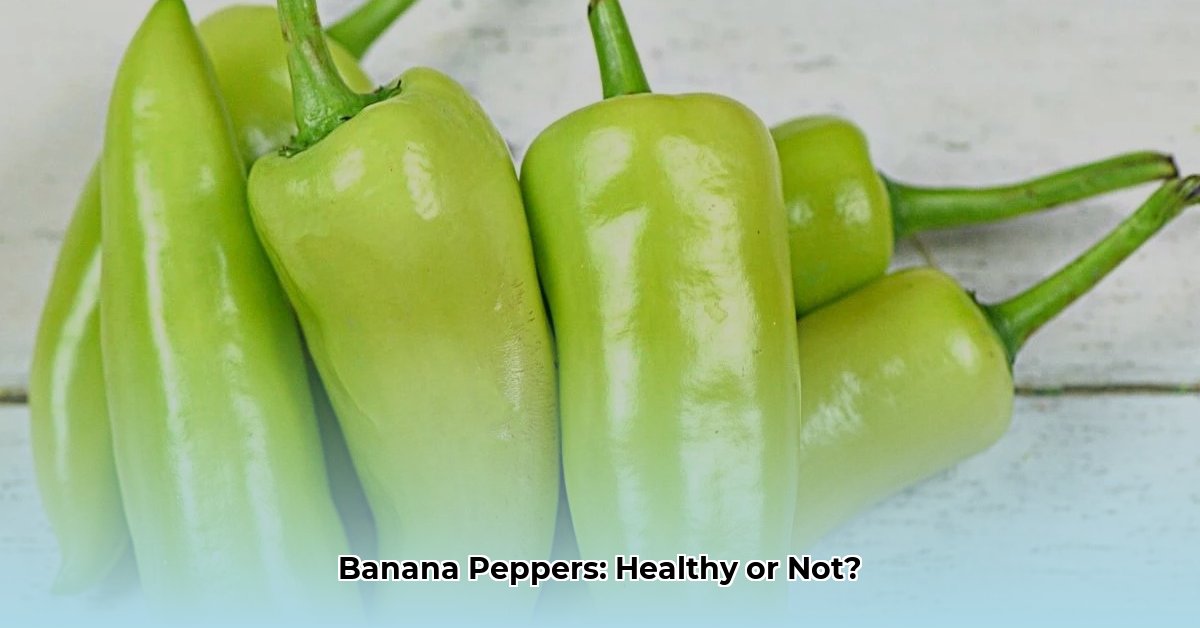Banana peppers add zing to salads and sandwiches, but are they actually good for you? Yes, generally! This article explores the nutritional value and potential health benefits of these mild, versatile peppers, offering a balanced perspective on their incorporation into a healthy diet.
Banana Pepper Nutrition: A Detailed Look
Banana peppers offer a surprisingly robust nutritional profile. They’re low in calories and a good source of several vitamins and minerals.
Quick Nutrition Facts (per 100g serving of raw banana peppers)
| Nutrient | Amount (approx.) | % Daily Value (DV) |
|---|---|---|
| Calories | 20 | <1% |
| Protein | 1g | 2% |
| Fat | <0.5g | <1% |
| Carbs | 4g | 1% |
| Fiber | 2g | 7% |
| Sugar | 2g | 4% |
| Vitamin C | 80mg | 89% |
| Vitamin B6 | 0.2mg | 12% |
| Vitamin A | 13mcg RAE | 1% |
| Vitamin K | 7mcg | 6% |
| Potassium | 190mg | 4% |
These values are approximate and can vary depending on growing conditions and pepper size.
Vitamin C and Immune Support
Banana peppers are an excellent source of vitamin C, a potent antioxidant that supports immune function. Vitamin C likely plays a role in protecting cells from damage, promoting wound healing, and enhancing iron absorption.
Vitamin B6 and Brain Health
A moderate source of vitamin B6, banana peppers may contribute to healthy brain development and function. Vitamin B6 is involved in the production of neurotransmitters like dopamine and serotonin, which are important for mood regulation.
Vitamin K and Bone Health
While not as rich in vitamin K as some leafy greens, banana peppers still provide a small amount of this nutrient, which is essential for blood clotting and maintaining bone health. Research suggests vitamin K may help improve bone density and reduce the risk of fractures.
Fiber and Digestive Health
The fiber in banana peppers can support digestive well-being. Fiber promotes regularity, may prevent constipation, and can contribute to feelings of fullness, potentially aiding in weight management.
Potential Downsides and Considerations
While generally safe, banana peppers may present some drawbacks for certain individuals.
Sodium Content in Pickled Banana Peppers
Pickled banana peppers often contain high levels of sodium due to the brining process. Excessive sodium intake can contribute to high blood pressure. If you’re watching your sodium intake, opt for fresh banana peppers or consume pickled varieties sparingly.
Heartburn and Digestive Issues
The capsaicin in banana peppers, while mild, can sometimes trigger heartburn or indigestion in sensitive individuals. Removing the seeds and membranes can reduce the heat and lessen the likelihood of these issues. Some people also experience gas or bloating after consuming peppers due to their fiber content.
Allergies
Though rare, pepper allergies can occur. Symptoms can range from mild skin irritation to more severe reactions like swelling and difficulty breathing. If you experience any unusual symptoms after eating banana peppers, seek medical attention.
Different Forms and Culinary Uses
Banana peppers are versatile and can be enjoyed in various ways.
Fresh Banana Peppers
Fresh peppers offer the most nutritional value and are lower in sodium than pickled varieties. Store them in the refrigerator for up to a week.
Pickled Banana Peppers
Pickling extends shelf life but adds sodium. Enjoy them in moderation.
Culinary Applications
-
Raw: Add sliced banana peppers to salads, sandwiches, or salsas for a tangy crunch.
-
Cooked: Incorporate chopped banana peppers into stir-fries, omelets, or pasta sauces. Roasting brings out a smoky sweetness.
Frequently Asked Questions
-
Are banana peppers hotter than jalapeños? No, banana peppers are significantly milder than jalapeños.
-
How should I store fresh banana peppers? Store them in the refrigerator in a sealed bag or container for up to a week.
The Bottom Line: Incorporating Banana Peppers into a Healthy Diet
Banana peppers can be a nutritious and flavorful addition to a balanced diet. They offer several vitamins, minerals, and antioxidants with relatively few calories. While pickled varieties can be high in sodium, fresh banana peppers are a low-sodium option that can be easily incorporated into a variety of dishes. As with any food, moderation and attention to individual sensitivities are key. If you have any concerns about incorporating banana peppers into your diet, consult with a healthcare professional or registered dietitian.
- Cooking Kits Make Mastering New Recipes Fun for Everyone - February 4, 2026
- Leak-Proof Glass Food Containers with Locking Lids Keep Food Fresh - February 3, 2026
- Glass Storage Containers With Glass Lids That Lock for Freshness - February 2, 2026










